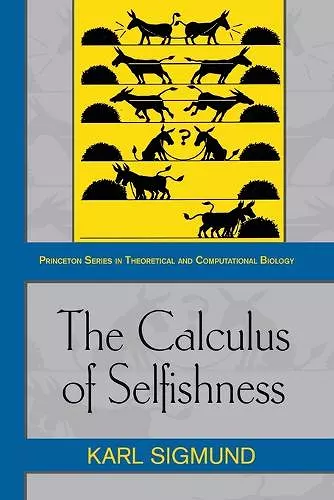The Calculus of Selfishness
Format:Paperback
Publisher:Princeton University Press
Published:12th Jul '16
Currently unavailable, and unfortunately no date known when it will be back

How does cooperation emerge among selfish individuals? When do people share resources, punish those they consider unfair, and engage in joint enterprises? These questions fascinate philosophers, biologists, and economists alike, for the "invisible hand" that should turn selfish efforts into public benefit is not always at work. The Calculus of Selfishness looks at social dilemmas where cooperative motivations are subverted and self-interest becomes self-defeating. Karl Sigmund, a pioneer in evolutionary game theory, uses simple and well-known game theory models to examine the foundations of collective action and the effects of reciprocity and reputation. Focusing on some of the best-known social and economic experiments, including games such as the Prisoner's Dilemma, Trust, Ultimatum, Snowdrift, and Public Good, Sigmund explores the conditions leading to cooperative strategies. His approach is based on evolutionary game dynamics, applied to deterministic and probabilistic models of economic interactions. Exploring basic strategic interactions among individuals guided by self-interest and caught in social traps, The Calculus of Selfishness analyzes to what extent one key facet of human nature--selfishness--can lead to cooperation.
"With collaborators from Vienna, Sigmund has pioneered the development of evolutionary game dynamics. This thought-provoking book is a distillation of his many influential contributions to the field. It is a showcase of clever models and elegant mathematics, replete with sometimes counterintuitive insights."--Nature "In The Calculus of Selfishness, Karl Sigmund provides a comprehensive and accessible mathematical exposition of the evolutionary game theory of selfishness. The book should prove accessible to natural and social scientists as its mathematical arguments employ intuition, geometry, and simulation with a minimum of axiomatic formality. The demands on the reader typically involve little more than linear algebra and calculus."--David Krakauer, Science "Sigmund's mathematical exposition is exemplary. He starts with the presumption that the reader has only rudimentary linear algebra and some notion of what a differential equation is, and he builds up from there, introducing more advanced concepts and results as needed. He avoids formal proofs and bookkeeping in favor of careful explanations of key points and illustrative calculations. As he teaches evolutionary game theory, Sigmund is also demonstrating how to write about applied mathematics."--Cosma Shalizi, American Scientist "Sigmund's writing is admirably clear and historically grounded and he wisely restricts his coverage primarily to a subset of situations... [Sigmund] makes fascinating reading for the interested general reader and provides a good background in game theory which should inoculate readers from being fooled by sloppy or completely incorrect references in the popular media."--Sarah Boslaugh, MAA Reviews "Sigmund has ... done an admirable job of motivating the material and making it accessible for the non-expert who is interested in theories to explain the evolution of cooperation."--Ross Cressman, Mathematical Reviews
ISBN: 9780691171081
Dimensions: unknown
Weight: 255g
184 pages